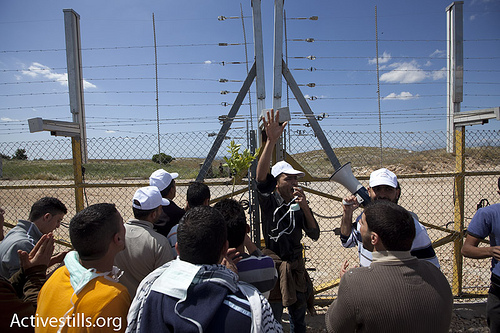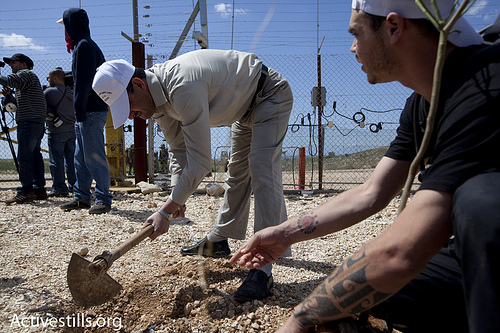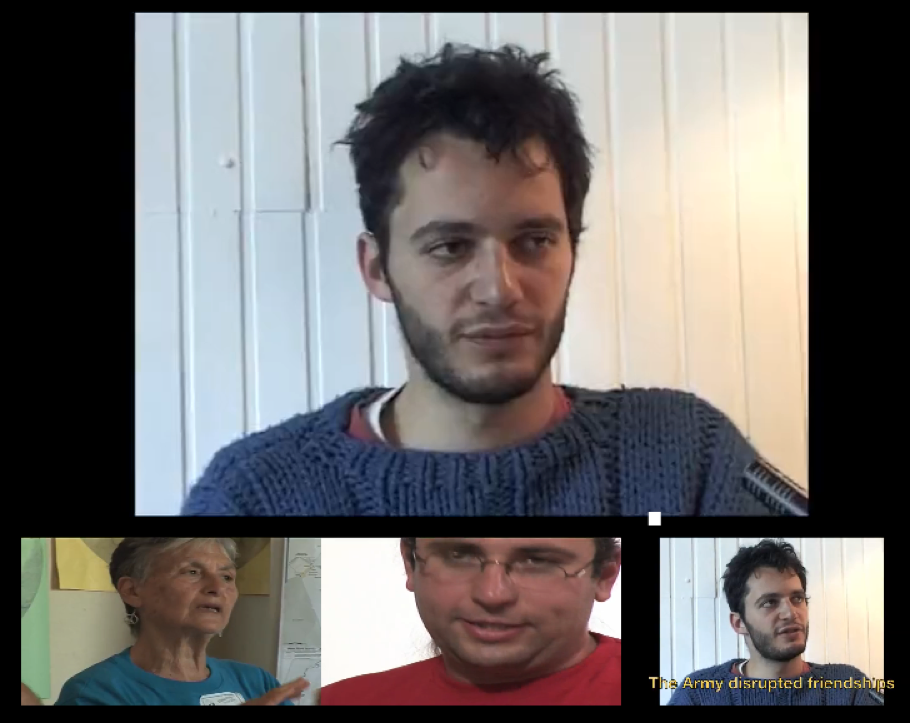The Only Democracy? » On The Ground Reports » Celebrating Passover and Land Day in Budrus
Celebrating Passover and Land Day in Budrus
By Rebecca Vilkomerson
Monday evening: a standard seder in north Tel Aviv with my family, where the story of the historic liberation of the Jews from oppression by organizing themselves (my own personal takeaway from the Pesach tale) passed quite quickly by in favor of dinner. Tuesday: the first day of Passover, which coincides this year with Land Day, when Palestinians mark the day in 1976 when Palestinian citizens of Israel, in protesting the expropriation of land by the Israeli government, organized marches and a General Strike. Six Palestinian Israelis were killed. Today, one of the many places commemorating Land Day is Budrus, a small Palestinian village about 12 km from Ramallah, or, in Israeli terms, just north of Mod’in, and just 3 km from the Green Line. I join two carloads of activists from Anarchists Against the Wall who are joining the people of Budrus in solidarity, just as they have, in one formation or another, for over six years now.
After a round of cold drinks and then another of hot coffee, we all don white baseball hats, which have been prepared in honor of the day. We start out through the village toward the Wall that cuts of Budrus from the rest of its lands. Budrus is the only place where Palestinian protests successfully changed the course of the Wall (Bil’in has since won a court case that also changes the Wall’s path, but it is yet to be fully implemented), and the women of Budrus are famous for their leadership and courage. As we march through the village, I notice they make up a very significant part of the demonstration.
It’s a beautiful, cool spring day. We march toward the Wall, and those at the front reach it. In the meantime, I chat with a visitor from the village of Nabi Saleh, which though it has a long history of resistance against the occupation, has only recently started weekly demonstrations. He too has come in solidarity with the people of Budrus. He explains to me the strategy in his village: there is no “popular committee” as there is in most villages, for everyone who lives there (just 400 people) are considered members of the committee. At the first demonstration in Nabi Saleh, women were again in the lead, and the Army targeted them. His own wife was arrested and held without charges for eight days. Many of the women were scared off by these tactics, but they have returned, and the demonstrations there continue, despite several severe injuries.
Soon, the first tear gas is shot, and then many more from the Israeli side of the fence. I had forgotten the panic you can feel as it burns your throat, your eyes and your nose and you feel like you can’t breathe. But I remember not to run and not to take deep breaths, but to just keep walking in the opposite direction of where the wind blows the gas. I tell myself that it will pass, and it does. I find myself on the road down toward the fence with the women. A young girl passes me a lemon to breathe into, which helps counteract the gas. After the next bout, I pass the lemon on to another woman who looks like she is having trouble.
The demonstration continues in that way. The braver folks up front stay there, while the rest of us, including me, hang back. Each time my eyes clear I move a bit forward again, but never as far as I drew before the gas began. I stick near the women and younger children, enjoying their presence, which at least for me changes the dynamic of the demonstration. In demonstrations in other villages, the women often watch from the roofs or their doorways, but don’t join in. There is always a small contingent of international women, but the overwhelming energy is strongly male. This feels more like a village outing, with everyone participating.
I hear sounds which I recognize as gunfire, but I am not experienced enough to know if it is rubber bullets or live ammunition. Of course, both can kill. An ambulance passes by, and word drifts back to us that the Israeli jeeps are passing though the fence towards the village. I fall into step with an American activist who is living in Tel Aviv, and we retreat into the village, but the gas finds us even there, as the Army is now inside the village. Some women invite us into their home. When I sit down and catch my breath, I see the room is full of women and children, ranging in age from about 4 to about 70. The hostess introduces us to her grandmother, who I had seen outside earlier. We are served tea, and attempt to talk. One woman knows just a bit of English, my companion knows just a bit of Arabic. This has always been my frustration when in Palestine, where it is the men who generally know English or Hebrew (usually from being in Israeli jails or having worked in Israel before the Wall was built). This has always meant that it is much harder to get to know the women. I admire the several Israeli activists who have learned Arabic and thus are not mute on these occasions.
There is some commotion, and we open the door as several children run out of the room to see what is going on outside. The littlest boy runs back with his eyes streaming, followed by several adult men who come in for just a few minutes to recover and then go back out again. The little boy is crying now for real and his mother comforts him, until he is distracted by playing with the bull horn. I am already starting to think about when we are going home, and then I pull myself up short: this little boy, and all the women hosting me, ARE home. This is neither the first nor last time these children will be tear gassed in their own front yards. I try to imagine what that must be like and fail utterly.
Eventually we wander back out. The protest continues in a more desultory fashion, and could for several more hours. One carload of Israelis, including me, decide it is time to go back home. As demonstrations go, its been pretty standard, nothing out of the ordinary. During the car ride, a short 40 minutes to Tel Aviv, I momentarily think of Pharoah’s daughter in the Pesach story, who after all committed one of the great acts of solidarity, and humanity, by rescuing Moses in the reeds in defiance of her own father. And I realize that it is in Budrus, and not at my own seder, that I have celebrated Pesach.
Once again, here’s the trailer for Budrus
Filed under: On The Ground Reports · Tags: Budrus, Holidays, Land Day, Passover, Stop The Wall










 “You have a choice! Israeli Anti-Militarists Speak”
“You have a choice! Israeli Anti-Militarists Speak”